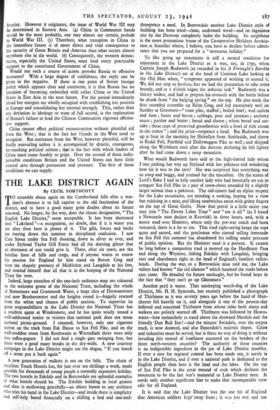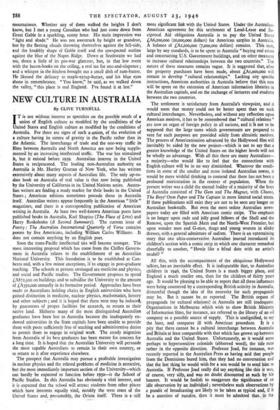THE LAKE DISTRICT AGAIN
By CECIL NORTHCOTT
TO scramble about again on the Cumberland fells after a war- time's absence is to fall captive to the old fascination of the district, and to have a good many grim doubts about its future renewed. No longer, by the way, does the classic designation, " The English Lake District," seem acceptable. It has been shortened into " Lakeland "—a recognition, no doubt, that if it is water you are after then here is plenty of it. The gills, forces and becks are roaring down this summer in disciplined confusion. I saw Cam Spout under Sea Fell shooting, down as silver as ever, and under Styhead Taylor Gill Force had all the dancing glitter that an afternoon of sun could give it. There, after six years, are the familiar lines of hills and crags, and if anyone wants to renew his passion for England let him stand on Rosset Crag and view the shapely greenery of Mickleden and Langdale at his feet, and remind himself that all that is in the keeping of the National Trust for ever.
Indeed, large stretches of the one-inch ordnance map are coloured in the welcome green of the National Trust, including the whole of Buttermere and Crummock Water, a large slice of Derwentwater and now Brotherswater and the heights round it—happily rescued from the whim and chance of public auction. To supervise its great responsibilities in the Lake District the National Trust has a resident agent at Windermere, and he has quite wisely issued a well-addressed notice to visitors that national park does not mean national picnic-ground. I counted, however, only one cigarette carton on the track from Esk Hause to Sea Fell Pike, and on the well-trodden route from Rosthwaite to Watendlath there were only two toffee-papers. I did not find a single gate swinging free, but there were a good many breaks in the dry-walls. A new courtesy campaign in the Lake District might use the slogan, " If you knock off a stone put it back again."
A new generation of walkers is out on the fells. The chain of excellent Youth Hostels has, for just over ten shillings a week, made possible for thousands of young people a normally expensive holiday. The two hostels in Eskdale and in Borrowdale are splendid examples of what hostels should be. The Eskdale building in local granite and slate is mellowing gracefully—an object lesson to any architect who tries his hand in the Lake District—and inside there is simplicity and self-help based financially on a shilling a bed and one-and-
threepence a meal. In Borrowdale another Lake District style of building has been tried—clean, undressed wood—and an ingenious site by the Derwent completely hides the building. Its neighbour is the more pretentious house of the Co-operative Holidays Assotia- tion at Seatoller where, I believe, you have to declare before admit- tance that you are prepared for a " strenuous holiday."
To like going up mountains is still a mental condition for enjoyment in the Lake District as it was,, say, in 1795, when Captain Joseph Budworth (as recorded in his A Fortnight's Ramble in the Lake District) sat at the head of Coniston Lake looking at the Old Man when, " symptoms appeared of wishing to ascend it. We did not stop to hesitate, but we had the precaution to take some brandy, and at a o'clock began the arduous task." Budworth was a thirsty walker, and had to prepare his stomach with the bottle before he drank from "the bulging spring" on the top. He also made the first recorded scramble up Helm Crag, and fed excessively well on Sunday at Grasmere—" roast pike, stuffed ; boiled fowl ; veal cutlets and ham ; beans and bacon ; cabbage, peas and potatoes ; anchovy sauce ; parsley and butter ; bread and cheese ; wheat bread and oat-
cake ; three cups of preserved gooseberries with a bowl of rich cream in the centre " ; and the price—tenpence a head. But Budworth was up at four in the morning for Helvellyn from Ambleside, and threw in Rydal Fell, Fairfield and Dollywaggon Pike as well ; and skipped along the Wythburn road after the descent declaring he felt lighter after he had come down a steep mountain.
What would Budworth have said to the high-heeled lady whom I met picking her way up Styhead with her pekinese and wondering how far it was to the tarn? She was surprised that everything was so steep and boggy, and yearned for the macadam. On the screes of Lord's Rake I had to help another lady who had heroically set out to conquer Sea Fell Pike in a pair of town-shoes attended by a slightly larger animal than a pekinese. The old-timers had an alpine respect for the Lake mountains, not minding a soaking, hoping for a view but rejoicing in a mist, and liking sandwiches eaten with grimy fingers on the top of Great Gable. Now that petrol is a little easier you may join " The Eleven Lakes Tour " and " see it all " (as I heard a Newcastle man declare in Keswick) in three hours, and, with a motor road over Honister, where only the pre-war coach and horn ventured, there is a lot to see. This road sight-seeing keeps the tops quiet and sacred, and the gentleman who started selling lemonade on Sea Fell this summer has abandoned his calling under pressure of public opinion. But the Honister road is a portent. It cannot be long before a companion road is mooted up the Hardknott Pass and along the Wrynose, linking Eskdale with Langdale, bringing cars and charabancs right to the head of England's loneliest valley- heads. During the war, so a Borrowdale man told me, the Lake valleys had known " the old silences " which haunted the roads before cars came. He dreaded the future onslaught, but he found hope in the fact that " they can't go up Glaramara."
Another peril is water. That unsleeping watch-dog of the Lake District, Mr. H. H. Symonds, has recently published a photograph of Thirlmere as it was seventy years ago before the hand of Man- chester fell heavily on it, and alongside it one of the present-day befirred and concreted Thirlmere from whose sides both sheep and walkers are politely warned off. Thirlmere was followed by Hawes- water—how melancholy to stand above the drowned Mardale and the friendly Dun Bull Inn !—and the minute Swindale, over the corpse track, is now doomed, and also Ennerdale's majestic slopes. Cities and industries must be served, but is there no way of doing it without invading this morsel of loneliness scattered on the borders of the three north-western counties? The authority of three counties is an indigestible ingredient in the pie of Lake District troubles. If ever a case for regional control has been made out, it surely is in the Lake District, and if ever a national park is dedicated to the English people then here is the land and the lakes. On the top of Sca Fell Pike is the great mound of rock which declares the mountain to be the last war's memorial to Lake District men. It needs only another significant line to make that incomparable view safe for all England.
It is said that the Lake District was thc one bit of England that American soldiers kept' away from ; it was too wet and too mountainous. Whether any of them walked the heights I don't know, but I met a young Canadian who had just come down from Great Gable in a sparkling, sunny hour. His main impression was "light and shade." He was not awestruck by height or grandeur, but by the fleeting clouds throwing themselves against the fell-side, and the knobbly shape of Gable itself and the unexpected outline against the blue of the Napes Ridge. Down at Seathwaite we had tea, shorn a little of its pre-war glamour, but, in that low room with the bacon-hooks on the ceiling, a real tea for one-and-sixpence ; and a whisper in the kitchen brought out a small dish of rum-butter. He likened the delicacy to maple-syrup-butter, and his blue eyes shone in remembrance. " You know," he said, as we walked down the valley, " this place is real England. I've found it at last."



























 Previous page
Previous page